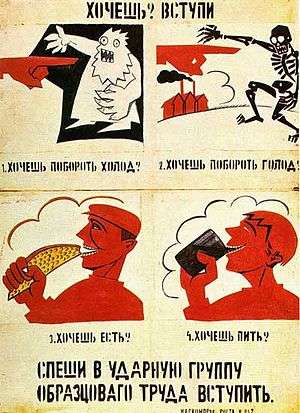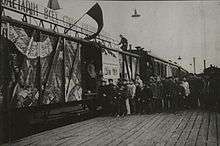Agitprop

"1. You want to overcome cold?
2. You want to overcome hunger?
3. You want to eat?
4. You want to drink?
Hasten to join shock brigades of exemplary labor!"
Agitprop (/ˈædʒᵻtprɒp/; from Russian: агитпроп [ɐɡʲɪtˈprop], derived from agitation and propaganda)[1] is stage plays, pamphlets, motion pictures and other art forms with an explicitly political message.
The term agitprop originated in the Russian SFSR (which later joined the Soviet Union), as a shortened form of отдел агитации и пропаганды (otdel agitatsii i propagandy), i.e., Department for Agitation and Propaganda, which was part of the central and regional committees of the Communist Party of the Soviet Union. The department was later renamed Ideological Department.
In the case of agitprop, the ideas to be disseminated were those of communism, including explanations of the policy of the Communist Party and the Soviet state. In other contexts, propaganda could mean dissemination of any kind of beneficial knowledge, e.g., of new methods in agriculture.
The term agitprop gave rise to agitprop theatre, a highly politicized left-wing theatre originated in 1920s Europe and spread to America; the plays of Bertolt Brecht are a notable example.[2] Russian agitprop theater was noted for its cardboard characters of perfect virtue and complete evil, and its coarse ridicule.[3] Gradually the term agitprop came to describe any kind of highly politicized art. After the October Revolution of 1917, an agitprop train toured the country, with artists and actors performing simple plays and broadcasting propaganda.[4] It had a printing press on board the train to allow posters to be reproduced and thrown out of the windows if it passed through villages.[5]
In the Western world, agitprop often has a negative connotation.
Forms
During Russian Civil War agitprop took various forms:

- Censorship of the press: Bolshevik strategy from the beginning was to introduce censorship over the primary medium of information in the former Russian Empire in 1917, the newspaper.[6] The provisional government, born out of the March Revolution against the tsarist regime, abolished the age-old practice of censoring the press. This created free newspapers that survived on their own revenue. The Bolsheviks' power over the provisional government lay in the Petrograd Soviet of Workers’ and Soldiers’ Deputies, because they could shut down industry and government by calling in workers and soldiers to strike and demonstrate. This ability to orchestrate strikes was especially helpful in the newspaper printing factories because a strike would mean a large loss in revenue, and the inability to continue to operate. The capability of strikes allowed the Bolsheviks to shut down any newspaper they wanted, creating a highly effective censorship mechanism that put a stop to the voice of the opposition. Lenin took control of the socialist newspaper Pravda, making it an outlet to spread Bolshevik agitprop, articles, and other media. With the Bolshevik capability to censor and shut down newspapers of opposing or rival factions, Pravda was able to become the dominant source of written information for the population in regions controlled by the Red Army .[7]

- Oral-agitation networks: The Bolshevik leadership understood that to build a lasting regime, they would need to win the support of the mass population of Russian peasants. To do this, Lenin organized a Communist party that attracted demobilized soldiers and others to become indoctrinated in Bolshevik ideology, dressed up in uniforms and sent to travel the countryside as agitators to the peasants.[8] The oral-agitation networks established a presence in the isolated rural areas of Russia, expanding Communist power.
- Agitational trains and ships: To expand the reach of the oral-agitation networks, the Bolsheviks pioneered using modern transportation to reach deeper into Russia. The trains and ships carried agitators armed with leaflets, posters and other various forms of agitprop. The agitational trains expanded the reach of agitators into Eastern Europe, and allowed for the establishment of agitprop stations, consisting of libraries of propaganda material. The trains were also equipped with radios, and their own printing press, so they could report to Moscow the political climate of the given region, and receive instruction on how to custom print propaganda on the spot to better take advantage of the situation.[9]
- Literacy campaign: Lenin understood that in order to increase the effectiveness of his propaganda, the cultural level of the Russian people would have to be raised by bringing down the illiteracy rate.[10] The peasant society of Russia in 1917 was largely illiterate making it difficult to reach them through printed agitprop. Lenin created the People’s Commissariat of Enlightenment to spearhead the war on illiteracy.[11] Instructors were trained in 1919, and sent to the countryside to create more instructors and expand the operation into a network of illiteracy centers. New textbooks were created, containing Bolshevik ideology to indoctrinate the newly literate members of Soviet society, and the literacy training in the army was expanded.[12]
See also
- Agit-train
- Blue Blouse
- Communist propaganda
- Propaganda in the Soviet Union
- Left Column (theater troupe)
- Russian Telegraph Agency (ROSTA)
Literature
- The Soviet Propaganda Machine, Martin Ebon, McGraw-Hill 1987, ISBN 0-07-018862-9
- Rusnock, K. A. (2003). "Agitprop". In Millar, James. Encyclopedia of Russian History. Gale Group, Inc. ISBN 0-02-865693-8.
- Vellikkeel Raghavan (2009). Agitation Propaganda Theatre. Chandigarh: Unistar Books. ISBN 81-7142-917-3.
References
- ↑ Definition by dictionary.com
- ↑ Richard Bodek (1998) "Proletarian Performance in Weimar Berlin: Agitprop, Chorus, and Brecht", ISBN 1-57113-126-4
- ↑ Richard Pipes, Russia Under the Bolshevik Regime, p. 303, ISBN 978-0-394-50242-7
- ↑ "Agitprop Train". YouTube. 2007-06-15. Retrieved 2009-05-09.
- ↑ Paul A. Smith, On Political War, p. 124, National Defense University Press, 1989
- ↑ Kenez, pp. 5–7
- ↑ Kenez, pp. 29-31
- ↑ Kenez, pp. 51-53
- ↑ Kenez, p. 59.
- ↑ Kenez, p. 70
- ↑ Kenez, p. 74
- ↑ Kenez, pp. 77-78
Sources
- Schütz, Gertrud (1988). Kleines Politisches Wörterbuch. Berlin: Dietz Verlag. ISBN 978-3-320-01177-2.
- Kenez, Peter (November 29, 1985). The Birth of the Propaganda State: Soviet Methods of Mass Mobilization, 1917–1929. Cambridge: Cambridge University Press. p. 342. ISBN 978-0-521-31398-8.
- Ellul, Jacques (1973). Propaganda: The Formation of Men's Attitudes. New York: Vintage Books. p. 320. ISBN 978-0-394-71874-3.
- Tzu, Sun (1977). Samuel B. Griffith (translator), ed. The Art of War. Oxford University Press. p. 197. ISBN 978-0-19-501476-1.
- Lasswell, Harold D. (April 15, 1971). Propaganda Technique in World War I. M.I.T. Press. p. 268. ISBN 978-0-262-62018-5.
- Huxley, Aldous (1958). Brave New World Revisited. New York: Harper & Row.
- Andrew, Christopher; Mitrokhin, Vasili (September 20, 2005). The World Was Going Our Way: The KGB and the Battle for the Third World. New York: Basic Books. p. 736. ISBN 978-0-465-00311-2.
- Andrew, Christopher (March 1, 1996). For the President's Eyes Only: Secret Intelligence and the American Presidency from Washington to Bush. New York: HarperPerennial. ISBN 978-0-06-092178-1.
- Riedel, Bruce (March 15, 2010). The Search for Al Qaeda: Its Leadership, Ideology, and Future (2nd ed.). Washington, D.C.: Brookings Institution Press. ISBN 978-0-8157-0451-5.
- Clark, Charles E. (2000). Uprooting Otherness: The Literacy Campaign in Nep-Era Russia. Susquehanna University Press.
External links
-
 The dictionary definition of agitprop at Wiktionary
The dictionary definition of agitprop at Wiktionary -
 Media related to Propaganda of the Soviet Union at Wikimedia Commons
Media related to Propaganda of the Soviet Union at Wikimedia Commons